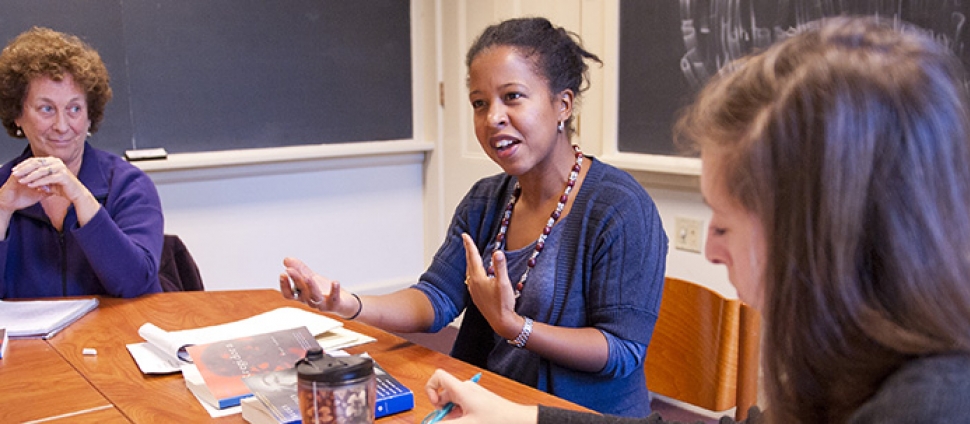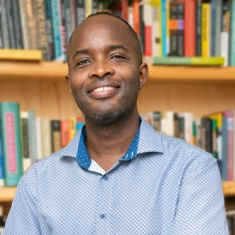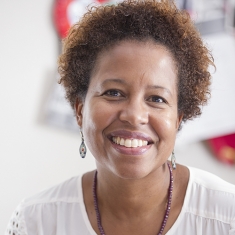Africana Studies

Africana studies considers how racial blackness, and the concept of race itself, influences the development of the modern world. We investigate the social, historical, cultural and aesthetic works and practices of populations of African-descent throughout the diaspora. A multidisciplinary and interdisciplinary endeavor, our interrogations begin not with race as an assumed concept but as a site of profound social formation that must be considered in relation to gender, class, nation, ethnicity, religion and sexuality. We encourage students to explore classes from such departments as philosophy, government, psychology, women and gender studies and more.
Announcements
In Memory of Distinguished Professor Emeritus Louis Wilson
The Smith College Department of Africana Studies will hold a memorial service in the Helen Hills Hills Chapel on Saturday, November 12, at 2 p.m. in honor of Louis Edward Wilson. Dr. Wilson came to Smith College in 1989, and was a vital member of not only Africana Studies, but also the African and American Studies programs. View his professional achievements at The History Makers website https://www.thehistorymakers.org/biography/louis-e-wilson We also welcome you to join us virtually at: smith.zoom.us/meeting/register/tJUrc-GhqTsrGNxcrHKYucPju1auJ7BBLkPw
The Africana Studies Spring 2022 Cromwell Fellowship Award Recipients
Essence Deras '23 - study of community-based political organizing in Capetown, South Africa
Sa'Mya Wilson '24 - study of social and political transformations in South Africa
AFR major Helen Bezuneh spotlighted
The college spotlighted Helen Bezuneh '23 on its Meet the Majors Website. Here is the link to her profile: smith.edu/meet-majors-africana-studies-2023
- Ability to study interdisciplinarily and multidisciplinarily
- Use close reading as evidence for argument
- Write a critical research paper
- Ability to study blackness/race intersectionally (that is, in regard to gender, class, nation, sexuality)
- Ability to study blackness/race in regard to the Diaspora
- Experience studying closely classic texts or figures or historical periods or movements
- Experience considering the aesthetic and theoretical principles undergirding 19th-, 20th- and 21st-century African American culture
The major in Africana studies is designed to introduce students to central methodological, theoretical and historical foundations through an interdisciplinary curriculum where students engage various disciplines, such as history, sociology and literature. African diaspora studies is an essential aspect of the curriculum. Two courses on the African diaspora are required for the major and students may choose African diaspora studies. Interested students are also encouraged to consider the minor in African studies or the Five-College Certificate in African studies as a supplement to their major.
Advisers
Members of the department
Study Abroad Adviser
Internships and study abroad may be offered where appropriate and with the necessary permissions of the department, the Committee on Academic Policy, and/or the Committee on Study Abroad.
Requirements for the Africana Studies Major
An Africana studies major will have experience:
- Studying closely classic texts, figures, historical periods or movements
- Considering the aesthetic principles undergirding 19th and 20th century African American culture
- Engaging texts, movements or events from many disciplinary standpoints
- Considering the impact of gender, class, nation, and sexuality on African American culture
- Thinking intellectually about the diaspora
A major is also strongly encouraged to study abroad as well as to take courses in all seven areas of Latin distribution.
The major consists of 11 four-credit courses as follows:
- Three required courses: 111, 117 and 201.
- General concentration: four 100- and 200-level courses; at least one of which must have a primary focus on the African diaspora. Courses at the 300-level may also be used when appropriate.
- Advanced concentration: three courses organized in one of five areas or pathways: history, literature/cultural studies, social science, black women's studies or diaspora studies. Of the three courses, at least one must be at the 300-level; and at least one must have a primary focus on the African diaspora.
- The designated capstone seminar in the junior or senior year. This course is required of all majors including honors thesis students.
The minor in Africana studies is designed to introduce students to central methodological, theoretical and historical foundations through an interdisciplinary curriculum where a student engages various disciplines such as history, sociology and literature.
Advisers
Members of the department
The minor consists of six four-credit courses as follows:
- Two of the three required courses: 111, 117, or 201.
- Four elective courses, at least one of of which must be a seminar or a 300-level class; and at least one of which must have a primary focus on the African diaspora.
Students interested in honoring in the Department of Africana Studies must complete all the major requirements and a thesis.
The thesis consists of an 8-credit honors course, pursued over one or two semesters and during which the student completes a long document of original research, followed by a public presentation and an oral examination. The credits for the thesis substitute for one or two of the elective courses in the major.
Eligibility
A student must have at least a 3.5 GPA for all courses in the major, and at least a 3.3 GPA for courses outside the major through the junior year. A student must have fulfilled the requirements for Latin Honors distribution by the time of graduation, and must otherwise fit the college's criteria for honors eligibility, as defined by the Subcommittee on Honors and Independent Programs (SHIP).
Application
A completed application consists of all the required forms from SHIP (available from the Class Deans Office), including the "Application to Enter Departmental Honors" and a two- to three-page proposal that describes the topic. This proposal should include the organizing questions, methods of analysis, a short bibliography, and it must be approved by the thesis adviser. The proposal should also discuss the student's preparedness to undertake the topic (including a discussion of coursework).
The student may also be required to attend a meeting with faculty to answer questions about her proposal. The department will vote on the proposal and then forward a recommendation to SHIP for final approval.
The application is due by noon on the last day of classes of the final semester of a student's junior year. This application will be reviewed by the department and returned to the student with comments for clarification, revision and consideration. The student must submit a revised and final application in the fall semester of her senior year, due by noon on the first Friday of the semester. The application should be submitted to 130 Wright Hall to the director of honors. A student who is intending to graduate in December should contact the director of honors for application guidelines.
Adviser
Any regularly appointed faculty in the department can serve as an adviser to the thesis. A student should contact the director of honors if there are questions. Early in the thesis writing process the adviser, in consultation with the student, will choose a second reader. This reader can be outside of the department.
Calendar
The specific deadlines for the thesis can be established by the thesis adviser but must fit within the overall guidelines put forth by SHIP. A student must complete a significant draft of her thesis by the first day of classes in the spring semester of her senior year. The final revised thesis is due the first day of April of that semester, and a student will schedule two presentations: one to her committee to take place before the start of final exams, and one open to the public. The dates and procedures for final submission of the thesis are outlined in the SHIP document and are the responsibility of the student.
Evaluation
The thesis should be at least 40 pages in length, or the equivalent of a creative project. In calculating the honors designation, the thesis counts 60 percent, the public presentation 10 percent, and the average of all courses taken in the department counts 30 percent.
For questions, a student should contact the director of honors in the department or the senior class dean.
Courses
History 430d
Thesis: 8 credits
Full-year course; offered each year
History 431
Thesis: 8 credits
Offered each fall
Fall 2023
- AFR 111 Introduction to Black Culture ***
- AFR 113 Themes in African Studies
- AFR 155 Introduction to Black Women's Studies
- AFR 170 Survey of African-American Literature 1746-1900
Spring 2023
- AFR 117 History of African American People
*** Courses listed with this asterisk count toward the Africana Studies diaspora requirement
Fall 2023
- AFR 201 Colloquium: Methods of Inquiry in Africana Studies
- AFR 202ba Topics-The Black Archive Methods of Inquiry in Africana Studies
- AFR 223 Caribbean Culture Thought: The Plantation, Diaspora and the Popular
- AFR 243 Black Activist Autobiography
Interterm 2024
Spring 2023
- AFR 202 Art, Activism and Representation
- AFR 202 Anthropology and the African Diaspora
- AFR 245 The Harlem Renaissance
- AFR 289 Race, Feminism & Resistance
- AFR 2** Caribbean Political Thought
- AFR 2** Black Political Economy
Fall 2023
- AFR
Spring 2023
- AFR 360 Toni Morrison
- AFR 399 Black Latinx Américas
*** Courses listed with this asterisk count toward the Africana Studies diaspora requirement
Fall 2023
- AFR 400 Special Studies
- AFR 430D Honors Project
- AFR 431 Honors Project
Spring 2024
- AFR 400 Special Studies
- AFR 430D Honors Projec
As an interdisciplinary department, we encourage students to explore course opportunities in other departments and in the Five Colleges. Some examples are listed below. Student should check the course catalog to find out the year and semester particular courses are being offered.
ANT 229 Africa and the Environment **
ANT 230 Africa: Peoples, Environment and Development Issues
ANT 271 Globalization and Transformation in Africa
ARH 290cv Visual Culture and Colonization **
DAN 142wa Dance Forms of the African Diaspora **
DAN 146 Hip Hop Dance **
DAN 242 Dance Forms of the African Diaspora: Intermediate: West African Dance **
DAN 246 Intermediate Hip Hop **
ECO 222 Economics of Race, Policy and Mass Incarceration **
ECO 230 Urban Economics
ECO 311 Seminar: Topics in Economics Development: The Political Economy of Development in Africa
EDC 343 Multicultural Education **
ENG 236 African-American Literature 1900 to the Present **
ENG 241 The Empire Writes Back: Postcolonial Literature—Ambreen Hai **
ENG 249 Literatures of the Black Atlantic
ENG 308im One Big Book--Ralph Ellison's Invisible Man from Jim Crow to Black Lives Matter **
ENG 309 Black Prison Intellectuals **
ENG 323 Seminar: Toni Morrison **
ENG 333ca Seminar: Chimamanda Ngozi Adichie **
FRN 230ww Colloquium in French Studies: Women Writers of Africa and the Caribbean — Dawn Fulton **
FRN 380af Topics: Cultural Studies- Les Années Folles -- Jonathan Gosnell **
FYS 148 Migration Stories: Border Crossing and Becoming in African-American Literature**
FYS 170 Black Lives Matter Everywhere **
FYS 182 Fighting the Power: Black Protest and Politics since 1970 — Samuel Ng
GOV 204 Urban Politics
GOV 227 Contemporary African Politics **
GOV 257 Refugee Politics
HST 234 Global Africa—Jeffrey Ahlman
HST 235 Independent Africa: A Social and Cultural History **
HST 257 Early African History to 1800—Jeffrey Ahlman
HST 258 History of Modern Africa since 1800—Jeffrey Ahlman **
HST 259 Aspects of African History: Decolonization, Nation and Political Imagination in Africa—Jeffrey Ahlman
HST 259 Aspects of African History: Women in African Colonial Histories
HST 259dd Colloquium: Topics In African History-Discourses of Development **
HST 259fm Colloquium: Topics in African History-Femininities, Masculinities and Sexualities in Africa **
HST 265 Race, Gender, and United States Citizenship, 1776–1861—Elizabeth Pryor **
HST 266 The Age of the American Civil War—Elizabeth Pryor
HST 270 Aspects of American History: Anatomy of a Slave Revolt—Elizabeth Pryor **
HST 276rj Colloquium: Topics-Historians Read the News-Race, Democracy and Reproductive Rights—Jeffrey Ahlman **
HST 371 Problems in 19th Century United States History: Remembering Slavery: A Gendered Reading of the WPA Slave Interviews--Elizabeth Pryor **
IDP 102 Thinking Through Race **
LAS 201 Caribbean Feminisms
MUS 205 Topics in Popular Music: Improvising Music: The Development of Jazz
PHI 210 Issues in Recent and Contemporary Philosophy: African American Philosophy
PHI 254 African Philosophy
POR 381 Seminar in Portuguese and Brazilian Studies: Angola, Brazil, and Cuba: Race, Nation, and Narrative—Malcolm McNee
PSY 263 Psychology of the Black Experience **
SOC 213 Race and National Identity in the United States
SOC 214 Sociology of Hispanic Caribbean Communities in the United States
SOC 218 Urban Sociology
SOC 243 Race, Gender, and Mass Incarceration **
SOC 350 Caribbean Feminisms **
SPN 252 Spanish Colonialism in Africa **
SWG 235 Black Feminism **
THE 221 Rehearsing the Impossible: Black Women Playwrights Interrupting the Master Narrative
THE 319 Shamans, Shapeshifters, and the Magic If—Andrea Hairston **
WLT 205 Contemporary African Literature and Film **
WLT 240 Imagining Black Freedom **
WLT 266md Studies in South African Literature and Film: Adopting Violence to the Screen—Katwiwa Mule **
WRT 291wb Topics: Lakes Writing Workshop-Writing, Because
**These courses are cross-listed with Africana studies
Guidelines
The Ida B. Wells Prize for Distinguished Work in Africana Studies is awarded annually to a senior for excellence in an essay or other project.
- No more than one submission per student. Work may be on any aspect of Africana studies and may be of any length; creative pieces or portfolios as well as analytic/scholarly essays are welcome. Submission must include this completed cover sheet.
- All papers should be paginated (i.e., each page should be numbered consecutively).
- Only clean, unmarked papers should be turned in (i.e., without teacher’s comments or grades).
- The prize will be awarded to work that is distinguished in achievement of its intellectual goals.
Use the following document to submit your work:
![]() Ida B. Wells Prize Coversheet (PDF)
Ida B. Wells Prize Coversheet (PDF)
Deadline
Papers are due by noon on May 1 by electronic submission to David Osepowicz. Items that cannot be submitted electronically may be submitted in hard copy to the program office, Wright Hall 107.
The Cromwell Fellowship is for students doing research and work in Black studies. You can fund research or an internship during interterm or the summer.
How To Apply
Please submit a 1-2 page statement with a cover sheet that includes your name, student ID 99 number, campus mailbox number and home address, and indicate if you have a Smith College direct deposit account.
Describe your research project or internship in detail and how it relates to both your academic and career goals. Include the following:
- a concise schedule
- detailed budget
- the names of two faculty references
Deadlines
Applications are due on November 4, 2022 at 9 a.m. for consideration for a interterm internship.
Applications are due on April 14, 2023 at 9 a.m. for consideration for an summer internship.
Please submit applications to Wright Hall 107 or by email to africanastu@smith.edu.
Emeriti
Ann Ferguson
Associate Professor Emerita of African American Studies
Paula Giddings
Elizabeth A. Woodson Professor Emerita of Africana Studies
Resources
Research Skills for Africana Studies Majors
All majors in Africana studies are expected to do research in three major areas—literature, history and social science.
View moreMeridians: feminism, race, transnationalism
This biannual interdisciplinary journal provides a forum for scholarship and creative work by and about women of color.
View moreThe Chronicle of Higher Education
An excellent source of news, information and jobs for those interested in a field in higher education.
View moreThe Journal of Blacks in Higher Education
Dedicated to the conscientious investigation of the status and prospects for African Americans in higher education.
View moreVirtual Exhibit of Black Women Artists
Students enrolled in Flávia Santos de Araújo’s Introduction to Black Culture course in the fall of 2019 created a virtual exhibit, “The Body Is Memory: An Exhibition of Black Women Artists.” The exhibit features nine curated pieces by Black women in a variety of genres, including pop music, photography, painting, poetry, dance and multimedia art. Each exhibit is designed to take viewers on a journey of appreciation and inquiry into different themes and concepts in Black culture across the diaspora.




